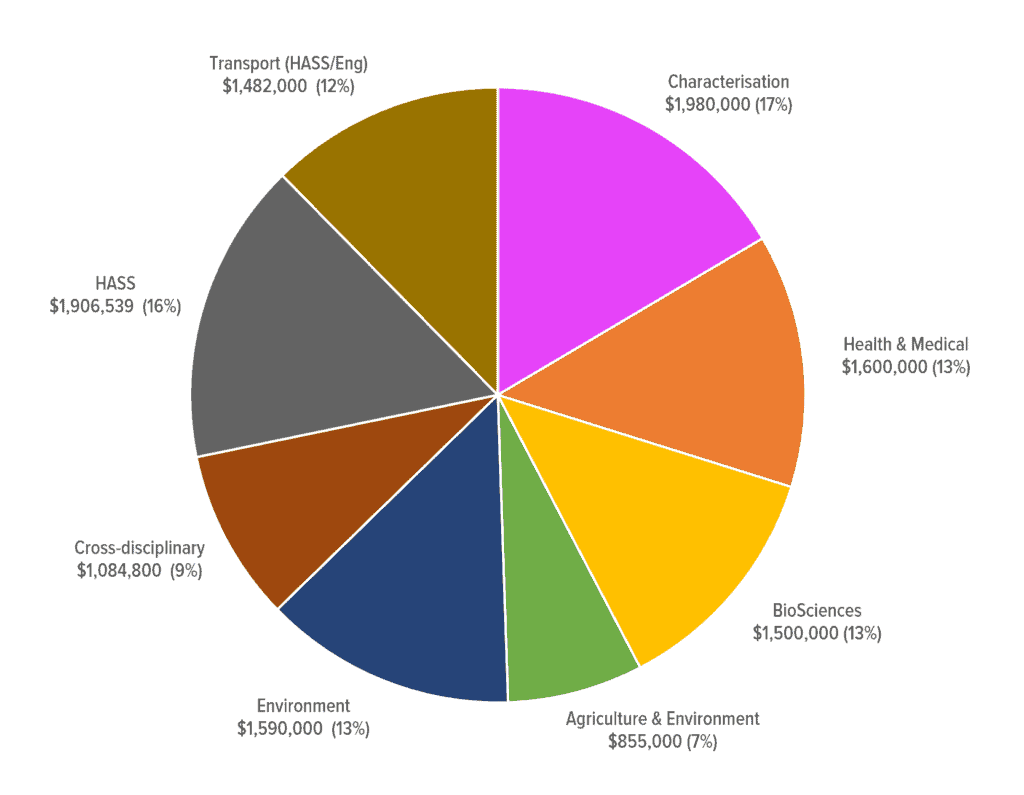
2024 eResearch Australasia Conference
Go to partner eventabout 2024 eResearch Australasia Conference
Two months ago, the Australian Research Data Commons (ARDC) invited the eResearch sector to submit proposals for new research-orientated platforms and services that connect and provide access to a range of resources to researchers and industry. We are excited to announce a total investment of $12 million, with $20.47 million in co-investments from collaborating organisations, for 10 new platform projects under the 2019 Platforms open call.
The successful platforms projects cover all of the National Science and Research Priorities and National Research Infrastructure Roadmap focus areas and are listed in the table below. The breadth of investment ensures Australia’s world class research system continues to improve productivity, create jobs, lift economic growth and support a healthy environment. Figure 1 shows the ARDC investment by research sector.
Lead: QCIF
International trading partners want to be able to trust Australia’s biosecurity assertions, and environmental decision makers need to be able to produce evidence based policy. EcoCommons will bring together datasets and tools for researchers and decision-makers concerned with all aspects of biodiversity and ecology, and track how the end results were derived.
Lead: Macquarie University
Capturing data in the field is expensive, error-prone, and inefficient. FAIMS will produce and manage mobile apps for a range of disciplines including earth sciences, archaeology, and agriculture, ensuring data is captured consistently and synced to the cloud. The platform will use modern web technologies and integrate with existing analysis environments to provide a seamless workflow.
Lead: University of Sydney
Universities and clinical sites across Australia are struggling to manage large volumes of imaging data, while balancing patient privacy and the need for sharing and accessibility in the research community. The Australian Imaging Service will transform the imaging and radiology sector by leveraging institutional investments and providing enhanced data management and analysis. The distributed federation will consist of multiple institutional deployments linked with a federated search layer, common community practice, support for expanded data types and a Trusted Tool Repository ensuring ongoing ownership and accountability of data.
Lead: University of Melbourne
Australian biology researchers are tackling key challenges in areas from cancer research to improved agricultural crops, but these require them to work with an ever expanding array of leading-edge digitally enabled bioinformatics research techniques. Biocommons BYOD will integrate data-generating instruments across genomics, proteomics and metabolomics, enhance accessibility to high-priority reference data, and manage access to data stores and compute infrastructures. The platform will support web and command-line access, expand access to Galaxy Australia and improve data transfer from instruments to analytics.
Lead: University of Melbourne
All levels of government need to work together to plan and invest in transport services and infrastructure that will improve public transport, reduce road congestion and vehicle emissions, improve national productivity and international competitiveness, and reduce air and noise pollution. The ATRC will enable researchers to analyse and model the impact of potential policy changes and planning decisions on transport and travel behaviour, allowing more informed decision making. The platform will provide integrated access to a range of high quality datasets (ABS Census and Journey to Work datasets, State Household Travel Surveys, National Road network datasets, real time traffic and public transport data, people flow data, public transport timetable data, and de-identified smart travel card datasets) and transport network analysis and simulation tools.
Lead: University of New South Wales
Undertaking research in fields including health, justice, housing, education, disability, social services and child protection increasingly requires application of computer analytics to large-scale, complex and potentially sensitive personal data. ERICA will provide a number of cloud-hosted ERICA project-specific, self-contained networking environments for researchers, within which they can perform state-of-the-art analytics on sensitive datasets. The platform will be delivered using Amazon Web Services (while exploring porting to the ARDC Nectar Research Cloud) and will provide project workspaces, virtual desktops, and a data audit trail.
Lead: Monash University
Unmanned Aerial Vehicles (UAV), commonly known as drones, provide sensing capabilities that address the critical scale-gap between ground and satellite-based observations, and offer a competitive advantage for researchers through the ability to deliver near real-time societally-relevant information. ASDC will coalesce and establish a national best practice approach for experimental and scalable drone data analytics, driven by exemplar data-processing pipelines. The platform will integrate sensing capabilities with easy-to-use storage, processing, visualisation and data analysis tools (including computer vision / deep learning techniques) to establish a national ecosystem for drone data management.
Lead: Australian National University
The Office of the National Data Commissioner (ONDC) has been established within the Commonwealth Government to streamline how public sector data is used and shared. CADRE will respond to this initiative by establishing a shared and distributed sensitive data access management platform for the social sciences and related disciplines to enable data owners and users to address the core concerns around governance, creation, management and sharing of sensitive data for research. The platform will combine a Five Safes (safe People, Projects, Data, Settings and Outputs) implementation framework for sensitive data, with pilots involving secure access environments, cloud storage, data linkage environments and urban data analytics.
Lead: Monash University
The confluence of Big Data and Machine Learning (ML) techniques is permeating all aspects of our lives, but access for researchers to necessary tools, training and resources is still patchy and uncoordinated. This platform will accelerate adoption of these techniques by Australian researchers, building on an international survey of research groups. The platform will support core ML tools for preprocessing, annotating, training, and validation, and integrate with software development environments to provide a consolidated platform for ML-based research.
Lead: Monash University
To succeed in science and engineering it is essential to be able to characterise the properties of materials. The ACCS will develop a coherent and accessible compute and data environment that promotes collaboration, increases ROI for the characterisation instruments, and delivers value for thousands of researchers in domains including Health, Advanced Manufacturing, Soil and Water, Food, Energy and Transport, and Resources. The proposed infrastructure, building on the Characterisation Virtual Laboratory, will be a rich ecosystem of computing systems, data repositories, workflows, and services, connected with instruments.
